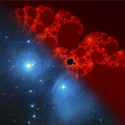|
Prurient Squid posted:One my of my favourite Bible passages is the one where they're on a boat and a furious squall is crashing around them and they're bricking it and they go to get Jesus and they find him sleeping and they say: And He goes out on deck and tells the sky to shut up and goes back to sleep.
|
|
|
|

|
| # ? Jun 3, 2024 09:51 |
|
aw hell yeah all the Christian Archie Comics are on archive.org
|
|
|
|
Jesus Calming the Storm is one of my favorite passages, too. I feel like it sums up his humanity and divinity in a great way, in that his divinity is expressed in such a human way. "Hey, quiet down, I'm trying to sleep."
|
|
|
|
I've been reading Acts and I find Gamaliel interesting. When the Christian leaders are brought before the council he argues that people have come and gone who claimed to be the messiah. Either they're right about Jesus at which point it would be against God to oppose them, or they're wrong at which point they'll go the same way as all the other pretenders to messiahdom. Neither of these options involved the council doing anything. Also I think he's related to that Hillel the Elder chap you guys like to bring up.
|
|
|
|
Keromaru5 posted:Jesus Calming the Storm is one of my favorite passages, too. I feel like it sums up his humanity and divinity in a great way, in that his divinity is expressed in such a human way. "Hey, quiet down, I'm trying to sleep." I adore all the moments where Jesus is noticeably frustrated with his close friends.
|
|
|
|
HopperUK posted:I adore all the moments where Jesus is noticeably frustrated with his close friends. It has come up often in the previous threads but "the apostles are cowards and idiots" is simultaneously one of the funniest but also most merciful themes of the Gospel according to Mark.
|
|
|
|
Is Wonka's Eggdicator that tells good eggs from bad eggs Calvinist? 
|
|
|
|
No. Like dogs eggs operate under universal salvation
|
|
|
|
BIG FLUFFY DOG posted:No. Like dogs eggs operate under universal salvation Even snake eggs??
|
|
|
|
HopperUK posted:Even snake eggs?? Universal doesn't mean "Universal, but not for those guys over there."
|
|
|
|
Forgive me, brothers and sisters, if this has been posted already: https://twitter.com/beanytuesday/status/1423056300162887682
|
|
|
|
Just having heard the stories my dad has told me about going to a Catholic school with some ruler at the ready nuns, it only took up to "some Shigurui type poo poo" for me to choke on my drink.
|
|
|
|
That's pretty good. Protestant vs. catholic crucifix is what did it for me. Actually the line right before that about catholic jesus looking like a skater boy who subsists only on cigarettes and red bull.
|
|
|
|
Protestant Jesus wearing cargo shorts got me.
|
|
|
|
That cartoon was great. I like the girl, she's very funny.
|
|
|
|
That comic got me smiling wider and wider, until I got to the last panel and died laughing.
|
|
|
|
I've been following the war pretty closely, as I'm sure some of you have, and of course the photos and stories coming out of the area north of Kyiv have taken a turn for the horrific. It's... well, it specifically reminds me of some of the atrocities photographed during WW2. And similar to when I first saw those images, it brings to mind the old problem of evil. The basic one, the one that pre-school age children point out all the time: why does evil exist, especially if your belief is that there is an all-powerful, all-benevolent God? And there are all kinds of answers, from all kinds of people and times and places and traditions. I've read some of them. But none of them have led to understanding for me, or deepened my faith. And to be clear, this is something that has troubled me for like ~10 years now; recent events just throw a particularly painful spotlight on it. I believe in something, my heart compels me even when I don't fully understand, but for the love of, well, God-- loving why?!?!
|
|
|
|
EggsAisle posted:I've been following the war pretty closely, as I'm sure some of you have, and of course the photos and stories coming out of the area north of Kyiv have taken a turn for the horrific. It's... well, it specifically reminds me of some of the atrocities photographed during WW2. And similar to when I first saw those images, it brings to mind the old problem of evil. The basic one, the one that pre-school age children point out all the time: why does evil exist, especially if your belief is that there is an all-powerful, all-benevolent God? And there are all kinds of answers, from all kinds of people and times and places and traditions. I've read some of them. But none of them have led to understanding for me, or deepened my faith. And to be clear, this is something that has troubled me for like ~10 years now; recent events just throw a particularly painful spotlight on it. I believe in something, my heart compels me even when I don't fully understand, but for the love of, well, God-- loving why?!?! We talk about it in the thread now and again. It's worth continuing to seek answers. I believe that human beings evolved from apes in such a way that we can be culturally, societally, sometimes biologically pressured towards selfish and evil acts, and that this isn't the 'will of God' but just how evolution produced us. I do believe in God but I don't believe he was tinkering with DNA and I don't believe he would interfere to stop a war from happening. That's for people to do.
|
|
|
|
For reasons that I won't elaborate due to doxing risk, I've seen an unusual amount of what's happening in Ukraine. The scale is unimaginable - miles and miles and miles of people's homes and lives, turned into blackened rubble. The comparison to WWII is not wrong. I don't have an answer for why these things happen in the universe that God created, at least not one that I'd hope to use to convince someone going through that pain. There are, however, a couple things that stand out as maybe worth thinking about in the context of our little religion thread. First, I don't really think the "null hypothesis" answer holds much water either. Evil may be hard to explain in the context of God, but that evil exists is one of those brute facts along the lines of cogito ergo sum. The alternative that evil doesn't actually exist, that we're getting all worked up over something of no more significance than the cosmic random number generator coming up 72501406637957742067 instead of 20152704608112812604, beggars belief at least to an equal extent. The other is from a sermon series that my church is doing on some of the wisdom literature - Proverbs, Ecclesiastes, and Job. There was an offhand comment that stuck with me, something like this: "Proverbs is the undergrad material - accessible but with surprising depth, practical and useful in everyday life. Ecclesiastes is the graduate material - deeper, worldly, cynical, ambiguous, but still often useful in practice. But Job is the research scholarship, extraordinarily deep but still scarcely scratching the surface of the deepest open problem." That open problem is the problem of evil, and the book's work is to describe and reject several approaches (particularly "you deserved it") but nonetheless to express trust that God is sovereign. In Job 2, before they open their mouths and screw everything up, Job's friends accidentally display probably the best approach for people who see evil happening to someone else beyond their own power to ameliorate: Job 2:11-13 posted:Now when Job's three friends heard of all this evil that had come upon him, they came each from his own place, Eliphaz the Temanite, Bildad the Shuhite, and Zophar the Naamathite. They made an appointment together to come to show him sympathy and comfort him. And when they saw him from a distance, they did not recognize him. And they raised their voices and wept, and they tore their robes and sprinkled dust on their heads toward heaven. And they sat with him on the ground seven days and seven nights, and no one spoke a word to him, for they saw that his suffering was very great.
|
|
|
|
That passage from Job forms the basis of how Jewish law dictates we should act towards a mourner. All the more so how much it applies to an ongoing tragedy. Thank you for bringing it.
|
|
|
|
My kitchen is currently in a state of quantum entanglement due to the upcoming Passover holiday.
|
|
|
|
I haven't read any of it, but my understanding is that there is a fair bit of scholarship in the Jewish community specifically on the question of "how can god let evil like this happen" coming specifically out of the Holocaust. Yad Vashem has a short 2 page summary of it and I suspect just looking up those writers is going to be a good place to start.
|
|
|
|
Captain von Trapp posted:For reasons that I won't elaborate due to doxing risk, I've seen an unusual amount of what's happening in Ukraine. The scale is unimaginable - miles and miles and miles of people's homes and lives, turned into blackened rubble. The comparison to WWII is not wrong. This makes sense to me. quote:The other is from a sermon series that my church is doing on some of the wisdom literature - Proverbs, Ecclesiastes, and Job. There was an offhand comment that stuck with me, something like this: "Proverbs is the undergrad material - accessible but with surprising depth, practical and useful in everyday life. Ecclesiastes is the graduate material - deeper, worldly, cynical, ambiguous, but still often useful in practice. But Job is the research scholarship, extraordinarily deep but still scarcely scratching the surface of the deepest open problem." That open problem is the problem of evil, and the book's work is to describe and reject several approaches (particularly "you deserved it") but nonetheless to express trust that God is sovereign. In Job 2, before they open their mouths and screw everything up, Job's friends accidentally display probably the best approach for people who see evil happening to someone else beyond their own power to ameliorate: This... well, the trust is what I'm having trouble with, personally. I can't reconcile this world and its ills with the God I want to believe in. As you say, evil is a brute fact of life; God is either unwilling or unable to change it; and to make matters worse, His reasons are unknowable and un-guessable by us mortals. And so we suffer, sometimes enormously so, and we're not even allowed the clarity to understand why. We just have to wonder and hope and guess and plead for better things, because everything has to be ~mysterious~. That's what benevolence and trust looks like? And the thing is, as far as comfort and security goes, I'm incredibly fortunate. So yay for me, but life being sweet for me and wretched for others doesn't feel right either. I was brought up to feel compassion for others, even people on the other side of the planet I've never met and probably never will. Because they're humans too, just as I am. Their lives and dignity have value. In the face of this grotesque abuse, I feel grief and helplessness and more sadness and bitterness than my faith, troubled as it is, has an answer for. So that's where I'm at. Thank you for coming to my
|
|
|
|
An alternative, is that God is the object of suffering with us and though the Holy Spirit as all of us. No theodicy, just the fact of the cross.
|
|
|
|
EggsAisle posted:And so we suffer, sometimes enormously so, and we're not even allowed the clarity to understand why. We just have to wonder and hope and guess and plead for better things, because everything has to be ~mysterious~. I wouldn't see it as like, God *could* explain but won't. I see it as, God can't explain, not in a way that we can understand while we're stuck with these silly monkey meatbrains. I imagine the afterlife as a state of returning to God and having a more perfect understanding. Maybe then it will make sense.
|
|
|
|
I've honestly never understood the problem with the problem of evil. At each moment humans in general have the choice between doing evil or doing good. If we didn't have the choice we wouldn't be humans. I rather think it's more important to try and do as much good, and live a moral life than to cast yourself into despair at the ills of the world. Likely you're not going to be able to make a difference on a grand scale, but if you can improve just one life then you've made the world a better place. From a more philosophical standpoint, I feel rather crass to suggest a sci-fi novel, but the framing of Book of the New Sun, and the whole of the Solar Cycle allow Gene Wolfe to deal with these topics in a way that's allows the reader to come to an intuitive understanding of them instead of a recieved understanding.
|
|
|
|
Funnily enough, cogito ergo sum is a very debatable thing, our resident Buddhists would debate it, as do many philosophers. But yes, I have not been able to think up a way to look at somebody going through horrible pain and say "it's al part of the Divine Plan." On an abstract, intellectual level, it makes sense that Good and Evil are just labels we gave to things and that a higher level of being, let alone a supreme being, would judge good and evil very differently from us. I recently read a Stephen King book where it's revealed the humans suffering in it are all just like ants being fried by children with a magnifying lens What is Life and Death, Good and Evil, to us is no more important than what ants think. But, whatever the reality is, it's what we feel and perceive that matters. It's like Free Will vs. Determinism. When I stand on the edge of a high place, I feel that sinking feeling in my gut because I know I could at any point throw myself to my death. That feeling of freedom is in everyone, as is the feeling of evil. Rationalizing either one away is pointless.
|
|
|
|
Gaius Marius posted:From a more philosophical standpoint, I feel rather crass to suggest a sci-fi novel You shouldn't. I have never read anything remotely like Book of the New Sun. Mark Kac once said (about Feynman, but it doesn't really matter), "There are two kinds of geniuses: the ‘ordinary’ and the ‘magicians.’ An ordinary genius is a fellow whom you and I would be just as good as, if we were only many times better. There is no mystery as to how his mind works. Once we understand what they’ve done, we feel certain that we, too, could have done it. It is different with the magicians..." Wolfe was a magician.
|
|
|
|
HopperUK posted:I wouldn't see it as like, God *could* explain but won't. I see it as, God can't explain, not in a way that we can understand while we're stuck with these silly monkey meatbrains. I imagine the afterlife as a state of returning to God and having a more perfect understanding. Maybe then it will make sense. I've envisioned something similar. Here's hoping! Gaius Marius posted:I've honestly never understood the problem with the problem of evil. At each moment humans in general have the choice between doing evil or doing good. If we didn't have the choice we wouldn't be humans. I rather think it's more important to try and do as much good, and live a moral life than to cast yourself into despair at the ills of the world. Likely you're not going to be able to make a difference on a grand scale, but if you can improve just one life then you've made the world a better place. Sure, free will. But my question on the nature of evil is more fundamental than that: if you're an infinitely powerful, infinitely good God, then why bother with evil at all? It's an almost childish frustration. quote:From a more philosophical standpoint, I feel rather crass to suggest a sci-fi novel, but the framing of Book of the New Sun, and the whole of the Solar Cycle allow Gene Wolfe to deal with these topics in a way that's allows the reader to come to an intuitive understanding of them instead of a recieved understanding. Insight can come from anywhere. NikkolasKing posted:But yes, I have not been able to think up a way to look at somebody going through horrible pain and say "it's al part of the Divine Plan." On an abstract, intellectual level, it makes sense that Good and Evil are just labels we gave to things and that a higher level of being, let alone a supreme being, would judge good and evil very differently from us. I recently read a Stephen King book where it's revealed the humans suffering in it are all just like ants being fried by children with a magnifying lens What is Life and Death, Good and Evil, to us is no more important than what ants think. Under the Dome, right? I think I got it as a present when it first came out, so it's been a while. I mean, if God is a cruel child with superpowers, then I guess I was wrong about a whole lot of things lol. But I think I know what you're getting at, that a supreme being understands "good" and "evil" in a way that we don't. We can't see the full picture. Hence the childish frustration: but whyyyyyyyyy? Thank you everyone for your thoughts.
|
|
|
|
NikkolasKing posted:But yes, I have not been able to think up a way to look at somebody going through horrible pain and say "it's al part of the Divine Plan." On an abstract, intellectual level, it makes sense that Good and Evil are just labels we gave to things and that a higher level of being, let alone a supreme being, would judge good and evil very differently from us. I keep coming back to an analogy from one of the Catholic apologists I've read. It hurts to learn how to play the violin; it causes real physical pain, there's genuine frustration, and the more you're trying your best, the harder it is to have your pain and frustration result in mediocre noise. But in the end it's worth it, because you can make beautiful music. And then you say "Zonohedron, how dare you compare bleeding fingers to a mother writing her child's name on that child's back so that she can be identified?" (I did see a photograph of just that, just now, and it was heartbreaking.) And the only response here is the response that the author whom I'm paraphrasing gave: you can't compare bleeding fingers to the horrors of war, but you can't compare the joy of playing the violin well to the joy of Heaven, either. We know that, somehow, things work out - we know that Jesus, who was God, and who could have called upon a legion of angels, surrendered himself to an excruciatingly painful, intensely humiliating death so that by that death he could destroy death. Somehow every tear will be wiped away from every face. Somehow, just like the infinitesimal suffering of learning to play an instrument can be transmuted into the moderate joy of playing that instrument well, the catastrophic suffering that makes even bystanders weep can be transmuted into the inestimable, inexplicable, indestructible joy of seeing God face to face. This doesn't mean saying "oh, no, your pain is good, actually," or, even, God forbid, "it's all part of the plan," because bad things are still bad! Jesus wept when he and Mary went to Lazarus's tomb, even though he'd already told the disciples, "And I am glad for you that I was not there, that you may believe," because even though he knew what he had in mind, it was still bad that Lazarus got sick, bad that he died, bad that his sisters had to grieve for him; it was the least of the bad things, but still, it was bad that the tomb was stinky!
|
|
|
|
EggsAisle posted:Under the Dome, right? I think I got it as a present when it first came out, so it's been a while. I mean, if God is a cruel child with superpowers, then I guess I was wrong about a whole lot of things lol. But I think I know what you're getting at, that a supreme being understands "good" and "evil" in a way that we don't. We can't see the full picture. Hence the childish frustration: but whyyyyyyyyy? Yes it was. A very good book, one of his best I've read. I still prefer The Shining and IT, though. Speaking of which, in the last year or so I've really tried to "understand" fiction in a deeper way. What is a story really about, how can I understand it better through various lenses/approaches, etc.. I feel like I've come to understand The Shining better in light of a discussion of despair on Reddit quote:Unlike other sins, however, despair is by tradition the sole sin that cannot be forgiven; it is the conviction that one is damned absolutely, thus a repudiation of the Christian Saviour and a challenge to God's infinite capacity for forgiveness The Overlook represents/preys on Jack's despair, his fear that he can never be forgiven for what he's done. He gives in and becomes the unforgivable monster he thought he was. So much more profound than the movie. If I want Jack Nicholson being evil, I'll watch Batman. (I've always respected King's irritation with how the film butchered his masterpiece and robbed of its depth and meaning. A piece of art with the moral twisted or dropped altogether is the greatest of travesties.)
|
|
|
|
I read a ton of Stephen King in high school; from what I remember, there's plenty to talk about if you view his work through a religious lens, though he's not a specifically "religious" author. Even something like Carrie, which isn't exactly subtle, has parallels like the symbolism of blood that are interesting to contemplate.
|
|
|
|
No forum post is going to solve the problem of evil for anyone, but at least for human-borne evils (as opposed to earthquakes and sicknesses), it's human fault. We have instructions on what to do, but we don't. We find ways to justify ourselves, from not uplifting the poor ("they don't deserve to live better!") to concentration camps ("this is what the Serbs deserve for not being Catholic?"). We - down to the person carrying out the act - could stop it, but we don't.
|
|
|
|
The Stand is definitely about Christianity and then some later books Regulators/Desperation touch on religion explicitly.
|
|
|
|
EggsAisle posted:I read a ton of Stephen King in high school; from what I remember, there's plenty to talk about if you view his work through a religious lens, though he's not a specifically "religious" author. Even something like Carrie, which isn't exactly subtle, has parallels like the symbolism of blood that are interesting to contemplate. Oh absolutely. I was originally drawn to King at least in part due to the cosmology in his works. I think anybody who has red King has read IT, so they'll remember IT is a cosmic being older than the universe itself. It's all spelled out really well in his novel Insomnia where we learn thre are two forces in the universe, The Purpose and The Random. IT is a being of The Random, and also tragedies like poor Gage's death in Pet Sematary are also part of this. Meanwhile The Purpose is seen in beings like The Turtle from IT or even the spirits which tried to keep the Creed family from being destroyed by Gage's death and the evil of the burial ground. It all paints a pretty clear religious understanding of existence - macrocosm and microcosm. The Stand is even more overt but I didn't much like the book so... I've also been rewatching Buffy the Vampire Slayer as I think I noted earlier. I bring it up mainly because in it there is a being called the First Evil. In both King and Buffy, Evil is very much a real, metaphysical thing that wars with Good. I remember the only Christian theologian I've ever known or talked to at length, who has also immersed themselves in a lot of the same pop culture as me, was not a big fan of this. He was very insistent on Evil as privation and not something that truly exists. Thanks to Augustine everybody calls this Manicheanism but it's very popular in fiction nowadays. And that interplay between fiction and religion fascinates me because: quote:...cultural products become for many people the main way they engage with theological matters. As Richard W. Santana and Gregory Erickson find in their anthology Religion and Popular Culture: Rescripting the Sacred, religious issues ‘of canonicity, scriptural authority, belief and unbelief are worked out not in churches and seminaries, not in our university classrooms, but in our popular culture’.92 Indeed, Stig Hjarvard outlined a theoretical framework known as ‘mediatization’, that, he suggests, along with the ‘metaprocesses’ of ‘modernization’ and ‘secularization’ have shaped the way people view religion. Among the many aspects of his theoretical framework, he looks at the presentation of religion and the supernatural in media and popular culture in an attempt to identify the principles that create conditions for religious intuitional change and affect religious engagement from the public. He claims that the media is a conduit of ideas and language, and can therefore, ‘mold religious imagination in accordance with the genres of popular culture’.93 Moreover, he suggests that ‘the media have taken over many of the social functions of the institutionalized religions, providing moral and spiritual guidance and a sense of community’.94 This increased attentiveness to the theological in popular culture can be read as evidence of the return to religious considerations in society, or a post-secular religious revival in the public sphere. People once predicted that Fantasy would die out, ya know, just like they predicted religion would. Fantasy & Religion were simply immature ways of understanding natural phenomena. Well, I think the popularity of things like King, Buffy, Harry Potter, Supernatural, True Blood, X-Files, and god knows what else shows these folks were dead wrong. People have a spiritual hunger more than ever, and they fill it with fiction like this. NikkolasKing fucked around with this message at 06:13 on Apr 5, 2022 |
|
|
|
Captain von Trapp posted:You shouldn't. I have never read anything remotely like Book of the New Sun. He really was a magnificent mind. There's a catagory of people who I consider true artists, people whose work is so transcendent that it can totally reframe the way we think and act. When we lost Wolfe we lost one of those, in terms of Literature only Goethe and Ryukishi07 have had as much impact on my life. I often find myself asking what Silk would do in situations I come across. NikkolasKing posted:Yes it was. A very good book, one of his best I've read. I still prefer The Shining and IT, though. I mean Jack isn't just evil in The Shining(film). With a filmaker like Kubrick especially you really need to be paying attention to the Mise en scene. Kubrick is a master of leaving things said only by design. The Overlook is specifically shot in a way that doesn't make spatial sense. The hotel is a maze that defies logic, this is purposeful. Jack in the film has done something horribly wrong. What it is exactly isn't elaborated on although you can get a good sense of it. Writing a book is inherently holding up a mirror to your soul, you must put yourself into it. Jack cannot bring himself to write, he cannot confess. Think of the Overlook itself, built on top of a native burial ground. Just as Jack buries his own truth, the Overlook sits on top the resting place of peoples victimized and brutalized by the White Man, who merely smile for the camera and ignore what happened. Think of the people who "Fight" Jack. A woman, a child, and a Black Man. All groups that have been victimized by the White Man just as the Native tribes were. Jack is home at the overlook, he's the continuation of the abuse that the white man has perpetuated for centuries. When Shelly Duvall comes to see his writing he merely repeats "All Work and No Play makes Jack a Dull Boy" Jack can't even pretend to take responsibility for what he did, all he can think of is his own pleasure and needs. He can never escape the maze, he will always be trapped with the scores of fellow abusers, he's home. Kubrick says all this with very little in the way of dialogue, letting the Mise en Scene do the heavy lifting. For film especially I think Two quotes are important Francois Truffaut posted:I want my audience to be constantly captivated, bewitched. So that it leaves the theater dazed,stunned to be back on the sidewalk. I would like my audience to forget the place and time in which it finds itself, like Proust immersed in reading at Combray. I want above all emotion. This one from Truffaut on why he makes movies. And this one from Anne Gillian explaining why his films work quote:Recent research by the famous film theoretician Raymond Bellour – on cinema and hypnosis – and by the psychoanalyst Daniel Stern – on the pre-linguistic infant – casts a fascinating light on this issue.Bellour, at the end of an extensive review of the interactions between cinema and hypnosis, concludes baldly: “Emotion . . . amounts to hypnosis.” If we remember Truffaut’s eloquent description of his ideal spectator leaving the movie theater “bewitched . . . dazed, stunned to be back on the sidewalk,” the evocation of a hypnotized subject does come to mind. This connection between emotion and hypnosis allows Bellour to engage in an in-depth exploration of the complex network of perceptions that fiction activates for the spectator. The hypnotic state has been compared to the pre-linguistic child’s reception of reality, in which the body fully participates. This is where the research conducted by Daniel Stern becomes central to Bellour’s argument. Stern’s book offers a riveting account of the child’s first reactions to his environment and the modalities of a perceptual mode that the acquisition of language will either repress or fracture. His views sharply differ from previous descriptions, in particular those of Piaget. Unlike Piaget, who considers the child’s development as a series of successive stages, each replacing the previous one, Stern asserts that both systems, pre- and post-linguistic, remain active and develop in parallel throughout life without ever meeting each other. Language cannot and will not “translate” the pre-linguistic system that will be reactivated throughout life in a variety of human contexts, such as intersubjective, analytical, or religious or aesthetic experiences. In art, the formal components are for the adult subject the vectors of this experience, and style will trigger the pre-linguistic perceptual mode. Aesthetic emotion that involves, as it does in the infant’s perceptions, a physical component promotes, as hypnosis does in the field of psychotherapy, a reordering of memories and a realignment of past and present that endows the experience with healing properties. The strength of Film is the ability for it to transport us into that world, of symbols and emotion. But you need to give yourself fully over into the film, an act of faith to yield yourself completely to the directors vision. To attempt to analyze a film in the moment is folly, one must focus all attention on the work in front of them and be transported into the world that's created on the screen. One who views a film could see the moment Antoine Doinel runs to the sea and "understand" on a conceptual layer that the character feels free and elated. But one who experiences film will see Antoine start running, and feel the wind blowing back their hair, their heart pounding, the mix of elation of being free again and the subsumed fear that they'll be caught. They will be Antoine in that moment.
|
|
|
|
You are of course free to interpret any piece of media however you please but do you really think sexual and racial politics were on Kubrick's mind? This is the guy who turned the fierce fighter Wendy into a sickeningly stereotypical damsel in distress. A fact he doesn't deny https://screen-queens.com/2014/06/04/king-vs-kubrick-the-shinings-wendy-torrance/ quote:It’s no secret that Stephen King hates Stankley Kubrick’s version of “The Shining”. In a 2013 interview with BBC, Stephen King described Kubrick’s version of Wendy Torrance as “One of the most misogynistic characters ever put on film. She is basically just there to scream and be stupid and that’s not the woman that I wrote about." Also I've only heard horror stories about Shelley Duvall's treatment behind the scenes. But since this was before the age of SRSM (Self-Righteous Social Media)_ nobody really cares and Kubrick gets to remain a celebrated legend for a few overrated movies.
|
|
|
|
You're projecting Kings view of the work onto Kubrick's work instead of your own. Shelly Duvall is not Kings character, she is Kubrick's. I absolutely do think that Kubrick had all this in mind. He was an auteurs auteur having his hand in writing directing and editing. Nothing made it into the film that he didn't want in. The fact that he chose Duvall is a point in my favor not yours. He chose her because her and Danny are both abuse victims. That's what's unsaid. Jack can't admit it, the film won't admit it directly, that's why he's stuck with the others who took advantage of his privilege in the overlook. Kubrick didn't make a few overated movies. Please actually look at the things people say of his films, he isn't a legend by chance. https://www.collativelearning.com/t...eir%20children. Gaius Marius fucked around with this message at 07:45 on Apr 5, 2022 |
|
|
|
Bar Ran Dun posted:An alternative, is that God is the object of suffering with us and though the Holy Spirit as all of us. I actually really like this. The Spirit inhabited the physical body of Jesus Christ, and we as believers in the metaphysical body of Christ are inhabited by the Spirit as well. Christ is at the head of the body, which implies a very deep connection to Him and to other believers for all of us - to me, yes, I fully agree that suffering on the part of one "organ" in the body of Christ pains God the Son, which in turn pains the Godhead.
|
|
|
|

|
| # ? Jun 3, 2024 09:51 |
|
I haven't read 90% of this page but I saw someone say Ryukishi07 and if someone wants to talk about Umineko in connection with Christianity I'm kind of interested in that. Because reading the Episode 2 Tea Party literally made me faint because of the blood squick and that's one of the things that sort of made me interested in Christianity. It made me realise that some things are so horrifying that you have no choice to believe in something. I'm probably weirdly oversharing but if I can't out my strange private thoughts / rituals here then where?
|
|
|




































